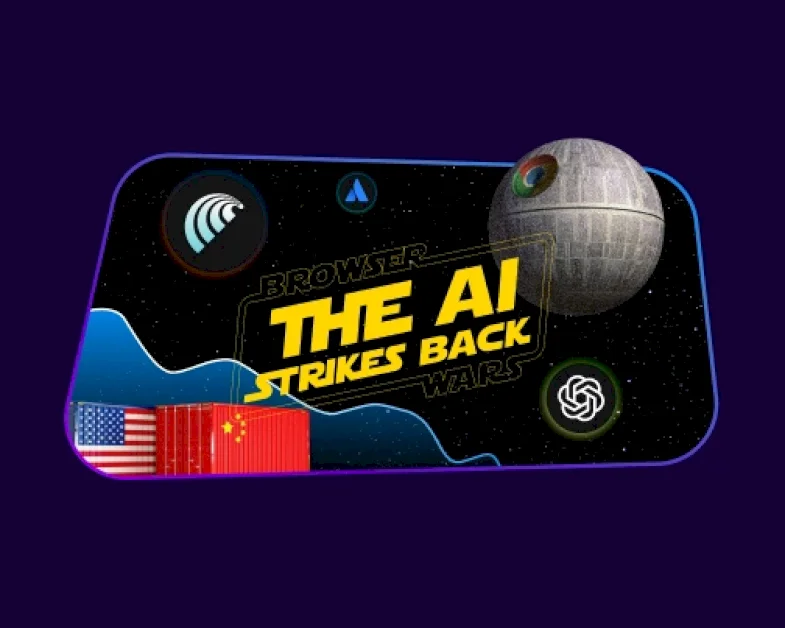Paid Media Updates

By Tinuiti Innovation & Growth Team
What’s in store
- Featured story: Browser Wars – The AI Strikes Back
- Our Take On the News
Featured Story: Browser Wars – The AI Strikes Back
The browser wars are back, but this time, the battle isn’t about speed or UX polish. It’s about which AI agent will guide consumer journeys, capturing intent and monetizing fulfillment.You may recall the fallout from Judge Mehta’s ruling that Google illegally maintained a search monopoly. At the time, some speculated that Google could be forced to divest Chrome. Instead, the remedies landed with a whimper;. With little standing in its way, Google now appears poised to lead the next phase of agentic browsing, embedding AI companions directly into Chrome.
Historically, browsers have been the internet’s control rails. Google understood this early, first with the Toolbar, and then with Chrome. Where there’s distribution, there’s monetization. Just ask Meta – whose inability to control Safari’s browser has long stifled its ambition to own the full ad journey.
Now, a new cohort of challengers is redefining the landscape – not as portals, but as companion agents. Perplexity, for example, recently launched Comet, a browser experience designed around conversational AI. Rather than search, users will rely on agents that parse, retrieve, and act on web information autonomously. We’ve previously covered this idea in the context of agentic commerce, but browsing may be the more immediate on-ramp to mainstream acceptance of agentic deference.

It’s a bold pivot for Perplexity, which had previously focused on monetization via contextual advertising and category takeovers. The sudden exit of Taz Patel, its Head of Advertising, raises questions about its ad ambitions. For now, Perplexity appears to be prioritizing distribution and trust-building over monetization, risking business model clarity in pursuit of market share.
OpenAI, meanwhile, while speculated to be launching a browser “in coming weeks” according to a Reuters article from July, remains oddly absent, only going so far as to embed browsing into ChatGPT, rather than creating a standalone browser. The goal: a ubiquitous co-pilot that can weave live web context into every interaction.
And then there’s Atlassian, which announced its acquisition of The Browser Company (maker of Arc and Dia) to build a workplace-native browser. It’s a fundamentally different play, focused not on ads, but on streamlining enterprise knowledge workflows.
Meta remains notably absent. Despite its dominance in apps and advertising, its browser ambitions remain unrealized, perhaps a legacy of failed hardware and OS bets.
Why this matters for advertisers: Browsers are no longer just entry points, they’re becoming fulfillment engines. The shift from “search” to “serve” is real. Google is uniquely positioned to profit through agent-driven ad experiences in Chrome. Perplexity may resist ads, for now. Atlassian could reshape how B2B buyers discover and decide.
We’re heading toward a fractured ecosystem: Chrome at scale, OpenAI ambiently, Perplexity vertically, and Arc in the enterprise. Browsers once fought to be your homepage, now they want to be your co-pilot. Whoever wins won’t just get your clicks, they’ll get your trust, your tasks, and your time.
| BBC, TechCrunch, AdAge, Reuters
What We’re Tracking
The news stories we’re tracking that are likely to impact advertisers in the month ahead.
Economy
- Consumer Weakness: U.S. consumer confidence and sentiment both slipped in August, as job concerns and tariff worries weighed on outlooks. | Bloomberg
- Labor Market Weakness: A dismal August jobs report reinforced impressions of a weakening job market, and cemented the case for a September rate cut. | WSJ
- Growth vs. Strain: Q2 GDP was revised upward thanks to spending and AI investment, but factory activity contracted for the sixth month in a row. | WSJ, Bloomberg

- Warning Indicators: Lumber prices are sliding, signaling a construction slowdown and broader economic caution. | WSJ
Advertising & Media
- Ad Market Pressure: U.S. ad spending fell for the first time in nearly two years, down 5.6% in July. | MediaPost
- Sports & Streaming Shakeups: NBCU sold out Super Bowl ad inventory early, with record-high pricing ($8M per spot). | Adweek
- Industry Tensions: Media buyers blocked Publicis’ Epsilon SSP over data leakage risks, shifting spend elsewhere. | Adweek
Tech & Platforms
- M&A Moves: Atlassian acquired The Browser Company for $610M, edging out reported interest from OpenAI and Perplexity. | CNBC
- E-commerce Shifts: Amazon reversed its retreat from Google Shopping, reshaping paid search competition for performance marketers. | Digiday




